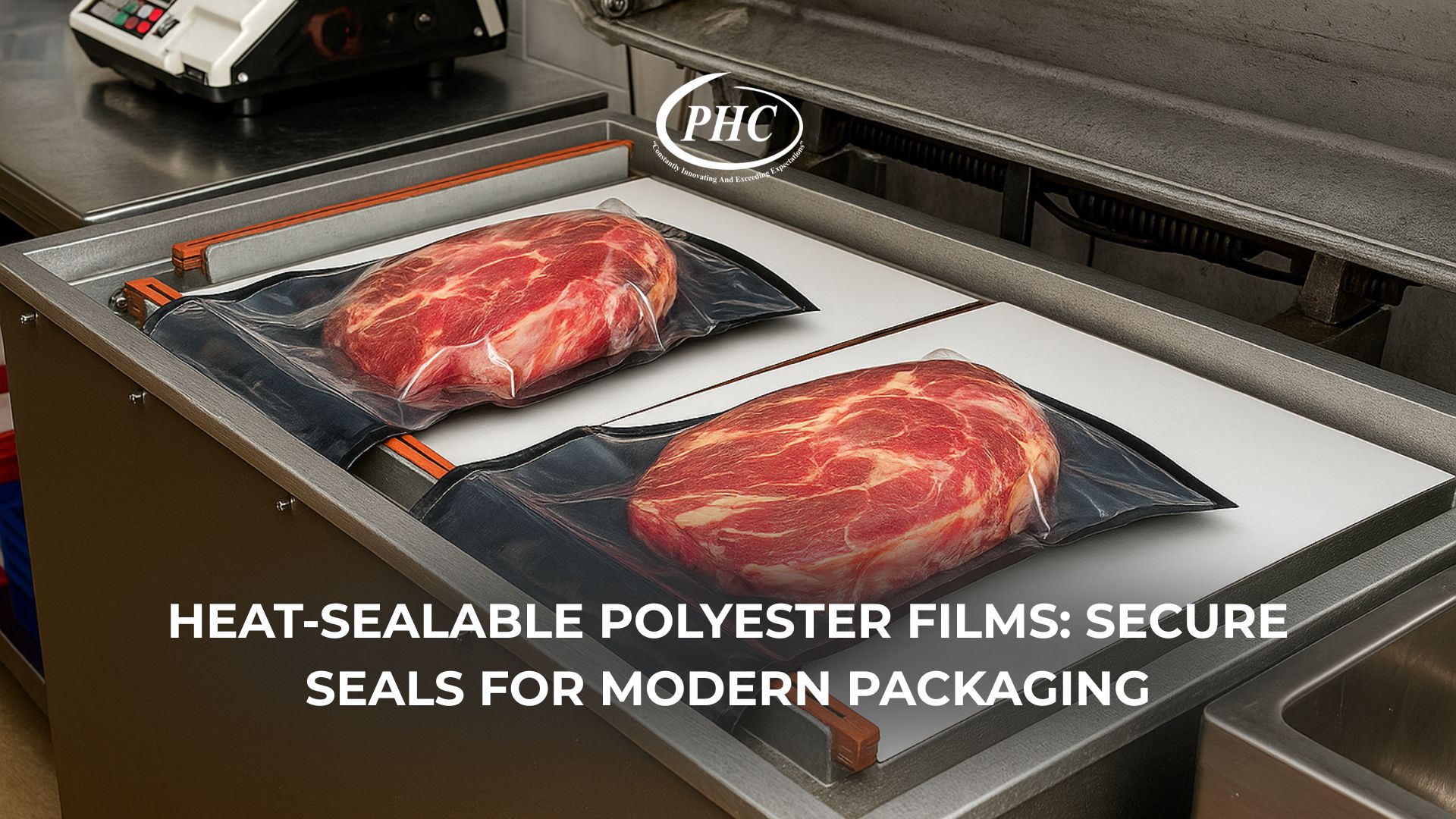In today’s fast-paced world of flexible packaging, consumers and manufacturers alike demand materials that offer reliability, shelf stability, and sustainability — all without compromising efficiency. One of the unsung heroes behind modern pouches, lidding films, and vacuum-sealed bags is the heat-sealable polyester film.
At Pilcher Hamilton Company (PHC) — located at 850 South Buncombe Road, Greer, South Carolina — we supply and convert heat-sealable PET films designed for secure, consistent sealing across a wide range of packaging formats. From food and beverage products to medical and industrial applications, these films deliver airtight performance, durability, and clarity, backed by local support and fast delivery.
If you’ve searched for “polyester near me” in the Southeastern U.S., PHC stands as your trusted regional source for high-performance heat-seal PET films, precision-slit rolls, and technical converting services.
What Makes PET Films Heat-Sealable?
1. The Science of Heat-Sealability
Polyester — known chemically as polyethylene terephthalate (PET) — is valued for its strength, optical clarity, and barrier properties. However, untreated PET on its own does not readily seal under standard heat and pressure conditions.
To make PET heat-sealable, manufacturers apply a special surface coating or co-extruded sealant layer that softens and bonds when exposed to controlled heat and pressure.
This heat-seal layer is engineered for:
- Precise seal initiation temperature (SIT) — typically 110°C to 180°C
- Rapid sealing at high line speeds
- Clean, peelable or permanent bonds depending on application
- Compatibility with a variety of substrates such as PET, PE, PP, foil, and paper
When heated, the sealant layer flows slightly and fuses to itself or to another compatible surface, forming a secure, hermetic (airtight) seal without adhesives.
2. Types of Heat-Sealable Polyester Films
At PHC, we supply and convert multiple types of heat-sealable PET films, each tailored for unique performance requirements:
- Co-extruded heat-seal PET: Features a built-in sealable surface compatible with other films.
- Coated heat-seal PET: Incorporates acrylic, PVDC, or copolyester coatings to enhance adhesion, gloss, and barrier protection.
- Dual-sided sealable PET: Enables sealing on both surfaces for complex pouch geometries or form-fill-seal processes.
- Peelable or tamper-evident PET: Designed for lidding and medical packaging where easy opening is required.
These films are designed to seal quickly and consistently across a range of packaging temperatures and dwell times — reducing energy use and optimizing throughput.
3. How Heat-Sealable Films Are Manufactured
The process of creating heat-seal PET films typically involves:
- Biaxial orientation — stretching the base PET film in two directions to achieve high strength and dimensional stability.
- Co-extrusion or coating — applying a sealable layer (often a copolyester or acrylic formulation).
- Thermal curing — ensuring the heat-seal layer bonds uniformly to the PET substrate.
- Surface treatment — corona or chemical treatment for printability and adhesion.
PHC sources high-quality base PET from domestic manufacturers and offers in-house slitting, winding, and corona treatment to meet precise sealing and converting specifications.
Explore our full product range on the Heat-Sealable Film Product Page.
Advantages: Airtight Seals, Barrier Protection & Versatility
1. Secure, Airtight Seals
The defining advantage of heat-sealable polyester films is their ability to form strong, reliable seals that protect products against air, moisture, and contamination.
Airtight sealing helps preserve:
- Freshness and aroma in food and coffee packaging
- Sterility in medical devices and pharmaceutical sachets
- Product integrity in industrial powders and chemical contents
Heat-seal PET films provide a tamper-resistant closure that maintains the contents’ quality throughout storage and transportation.
2. Mechanical Strength & Puncture Resistance
Because heat-seal PET is based on biaxially oriented polyester, it retains exceptional tensile strength and puncture resistance — crucial for protecting contents during filling, shipping, or retail handling.
Compared to other sealable materials (like polyethylene), PET provides:
- Higher tensile modulus (stiffer, stronger film)
- Less stretching during sealing or forming
- Enhanced dimensional control under heat
This mechanical robustness allows for thinner gauge films without compromising protection, supporting sustainability initiatives.
3. Barrier Performance
In addition to sealing capability, heat-sealable PET films provide excellent barrier properties against oxygen, moisture, and aroma transmission. This makes them suitable for:
- Food and beverage packaging (snacks, coffee, dry goods)
- Pharmaceutical pouches
- Industrial powders or volatile compounds
When combined with metallized or PVDC-coated layers, these films achieve ultra-high barrier performance — extending shelf life and reducing waste.
4. Optical Clarity and Printability
Heat-seal PET films offer high gloss and clarity, giving packaging a premium visual appeal. Their surfaces can be:
- Corona-treated for better ink adhesion
- Chemically primed for coating or lamination
- Printed directly using flexographic, gravure, or digital processes
PHC provides optional corona treating and printing services to ensure consistent adhesion and vibrant color reproduction.
5. Broad Compatibility with Packaging Processes
Heat-sealable polyester films are compatible with standard form-fill-seal (FFS), lidding, and lamination systems. They work seamlessly with:
- PET, PE, or PP structures
- Foil and paper laminates
- High-speed horizontal and vertical sealing equipment
Their wide sealing temperature range makes them flexible for multi-layer constructions, where PET serves as the sealant or outer printable layer.
6. Sustainability and Resource Efficiency
Because of their mechanical strength, PET films can be down-gauged — reducing thickness and material use while maintaining seal performance. PHC also supplies post-consumer recycled (PCR) PET heat-seal options for brands looking to reduce environmental impact.
PET’s recyclability and compatibility with mono-material packaging designs make it a cornerstone of sustainable packaging innovation.
Applications in Food, Medical & Industrial Packaging
The versatility of heat-sealable polyester films has made them indispensable across diverse sectors, especially where cleanliness, strength, and appearance matter.
1. Food Packaging
In the food industry, heat-seal PET films are used to create:
- Stand-up pouches and pillow bags
- Lidding films for trays and cups
- Vacuum packs and retort pouches
- Snack and confectionery wraps
- Coffee, tea, and spice sachets
Their ability to form airtight, tamper-resistant seals keeps food fresh, prevents leaks, and enhances shelf presentation. PET’s resistance to oils and moisture also makes it suitable for hot-fill and retort packaging.
For additional insights into PET packaging applications, read PHC’s Packaging Lineup Blog.
2. Medical & Pharmaceutical Packaging
In healthcare, packaging integrity is mission-critical. Heat-sealable PET films deliver the sterile protection required for:
- Medical device pouches
- Pharmaceutical sachets
- Diagnostic test kits
- Surgical and disposable product wraps
These films provide:
- Peelable seals for easy opening under sterile conditions
- Resistance to sterilization processes (gamma, EtO, autoclave)
- Clarity for product visibility and lot identification
Their chemical inertness ensures compatibility with sensitive medical materials and pharmaceutical contents.
3. Industrial Packaging & Sealant Tapes
Beyond food and healthcare, heat-sealable polyester films are valuable in industrial settings for:
- Sealant tapes and release liners
- Protective bags for parts or powders
- Barrier laminates for electronics and chemicals
- Adhesive carriers and lamination bases
Their ability to form consistent heat seals and resist abrasion makes them reliable for demanding environments where product containment and cleanliness are essential.
4. Specialty Uses
Custom heat-seal PET films also support:
- Peelable lidding for ready-meals
- Microwaveable packaging
- Reclosable zipper films
- High-temperature industrial laminates
PHC’s converting team collaborates directly with customers to match seal strength, peel profile, and temperature tolerance to their specific application — ensuring the perfect balance between performance and process efficiency.
Finding Heat-Sealable PET Films Near You
When sourcing heat-sealable polyester films, availability, consistency, and technical expertise are key. That’s where Pilcher Hamilton Company stands apart.
1. Local Inventory & Fast Delivery
From our facility in Greer, South Carolina, PHC maintains large inventories of PET film in multiple gauges, finishes, and coatings — including heat-seal grades.
This allows us to offer:
- Same-day or next-day shipping on standard items
- Custom-slit rolls and sheet formats via our Slitting Services
- Local pickup options for regional customers
- Reduced freight costs and faster turnaround for Southeast manufacturers
If you’re looking for “polyester near me”, our Greer warehouse and converting center ensure that high-quality heat-seal PET films are always within reach.
2. Complete In-House Converting Capabilities
PHC offers a full suite of film converting and finishing services, including:
- Slitting and rewinding to precise roll widths and diameters
- Sheeting and die-cutting for ready-to-use formats
- Winding and laminating for composite structures
- Corona treating and coating for adhesion optimization
By handling every step under one roof, we guarantee consistent quality and fast lead times — reducing the need for multiple suppliers.
3. Technical Support & Customization
Every heat-seal PET film project is unique. PHC’s technical team provides:
- Seal strength testing and temperature calibration
- Adhesion and print trials
- Barrier performance data
- Recommendations for compatible coatings or laminations
Whether you’re developing a new food pouch or upgrading a medical packaging line, we help you select the right film type, gauge, and sealing profile for your process.
4. Sustainable Solutions
PHC proudly supports sustainable packaging development through:
- Thinner-gauge, recyclable PET films
- PCR-based PET materials
- Solvent-free coatings and laminations
By choosing local, recyclable materials, customers not only reduce environmental impact but also strengthen regional supply chains.
5. A Century of Experience, A Local Advantage
Since 1904, Pilcher Hamilton has remained a leader in polyester film innovation. From industrial coatings to advanced packaging materials, we continue to evolve alongside our customers — providing the perfect combination of heritage, technical expertise, and local support.
Our South Carolina facility serves as a reliable supply hub for converters, manufacturers, and brand owners seeking consistent quality and responsive service throughout the U.S.
📍 Visit Us:
Pilcher Hamilton Company
850 South Buncombe Road
Greer, SC 29650
Request a Quote
Sealing Confidence, Delivering Performance
Heat-sealable polyester films represent the heart of modern flexible packaging — uniting strength, clarity, and barrier performance with dependable sealing capability. From fresh foods and medical devices to industrial goods, these films ensure products are safely sealed, clearly displayed, and fully protected.
At Pilcher Hamilton Company, we supply the heat-seal PET films that power today’s packaging innovations — and we do it locally, from our Greer, South Carolina facility.
Whether you need custom widths, printed rolls, or ready-to-seal laminations, PHC combines technology and tradition to keep your packaging process efficient, sustainable, and secure.
When you think of airtight packaging and polyester near me, think PHC USA — your partner for performance films and precision converting.

